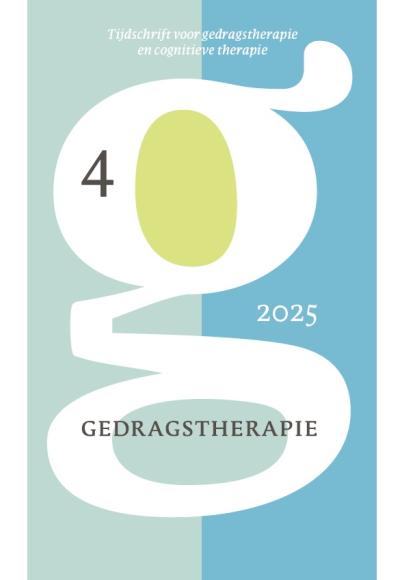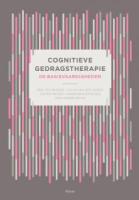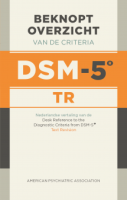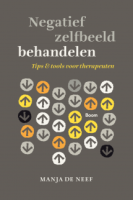Inhoud
Cognitieve therapie voor demoralisatie bij schizofrenie
Samenvatting
In dit artikel wordt een behandelprotocol geschetst om demoralisatie bij patiënten met schizofrenie te behandelen. De behandeling wordt geplaatst in de context van een cognitief model van demoralisatie. De nadruk van dit model ligt op overdreven negatieve verwachtingen omtrent de eigen capaciteiten en sociale uitstoting. Deze verwachtingen vinden hun basis vermoedelijk in de geleden verliezen en cognitieve achteruitgang die patiënten hebben ondergaan, maar zijn desalniettemin vaak onrealistisch en werken vermijding en inactiviteit in de hand. Voor de assessment wordt het demoralisatie-interview gebruikt. Daarna bestaat de behandeling uit cognitief gedragstherapeutische interventies om de cognities waar mogelijk te corrigeren en vermijdingsgedrag op te heffen. Het doel van de therapie is niet om patiënten te herstellen tot hun oude niveau van functioneren, maar om ze te helpen bij het doorbreken van isolatie en inactiviteit door hun persoonlijke en situationele bronnen te mobiliseren en een zinvolle relatie te koesteren en doen groeien met de wereld om hen heen. Er worden verscheidene casusssen gebruikt om de theorie toe te lichten.
Literatuur
- Beck, A.T., Rector, N.A., Stolar, N., & Grant, P. (2009). Schizophrenia; cognitive theory, research, and therapy. New York, London: The Guilford Press.
- Clarke, D.M., & Kissane, D.W. (2002). Demoralization: its phenomenology and importance. Australian and New-Zealand Journal of Psychiatry, 36(6), 733-743.
- Cockram, C.A., Doros, G., & de Figueiredo, J.M. (2009). Diagnosis and measurement of subjective incompetence: the clinical hallmark of demoralization. Psychotherapy and Psychosomatics, 78(6), 342-345.
- Gard, D.E., Kring, A.M., Gard, M.G., Horan, W.P., & Green, M.F. (2007). Anhedonia in schizophrenia: distinctions between anticipatory and consummatory pleasure. Schizophrenia Research, 93(1-3), 253-260.
- Granholm, E., Ben-Zeev, D., & Link, P.C. (2009). Social desinterest attitudes and group cognitive-behavioral social skills training for functional disability in schizophrenia. Schizophrenia Bulletin, in press.
- Grant, P., & Beck, A.T. (2009). Defeatist beliefs mediate cognitive impairment and negative symptoms in schizophrenia. Schizophrenia Bulletin, in press.
- Haan, G. de, Van der Gaag, M., & Korrelboom, C.W. (2007). Competitive Memory Therapy (COMET) bij een psychotische vrouw met auditieve hallucinaties. Directieve Therapie, 27, 146-160.
- Kapur, S. (2003). Psychosis as a state of aberrant salience: a framework linking biology, phenomenology, and pharmacology in schizophrenia. American Journal of Psychiatry, 160, 13-23.
- Kapur, S., Mizrahi, R., & Li, M. (2005). From dopamine to salience to psychosis—linking biology, pharmacology and phenomenology of psychosis. Schizophrenia Research, 79, 59-68.
- Kingdon, D., & Turkington, D. (1994). Cognitive-behavioural therapy of schizophrenia. New York: The Guilford Press.
- Kissane, D.W., Clarke, D.M., & Street, A.F. (2001). Demoralization syndrome—a relevant psychiatric diagnosis for palliative care. Journal of palliative care, 17(1), 12-21.
- Korrelboom, C.W., Weele, K. van der, Gjaltema, M., & Hoogstraten, C. (2009). Competitive Memory Training (COMET) for treating low self-esteem: a pilot study in a routine clinical setting. The Behavior Therapist, 32, 3-9.
- Mauritz, M., & Van Meijel, B. (2009). Loss and grief in patients with schizophrenia: on living in another world. Archives of Psychiatric Nursing, 23, 251-260.
- Perivoliotis, D., & Cather, C. (2009). Cognitive behavioural therapy of negative symptoms. Journal of Clinical Psychology: in session, 65(8), 1-16.
- Rector, N. (2004). Disfunctional attitudes and symptom expression in schizophrenia: differential associations with paranoid delusions and negative symptoms. Journal of cognitive psychotherapy, 18, 163-172.
- Restifo, K., Harkavy-Friedman, J.M., & Shrout, P.E. (2009). Suicidal behavior in schizophrenia; a test of the demoralization hypothesis. Journal of the nervous and mental disease, 197, 147-153.
- Sensky, T., Turkington, D., Kingdon, D., Scott, J., Scott, J., Siddle, R., et al., (2000). A randomized controlled trial of cognitive-behavioural therapy for persistent symptoms in schizophrenia resistant to medication. Archives of General Psychiatry, 57, 165-172.
- Tarrier, N. (2001). The use of coping strategies and self-regulation in the treatment of psychosis. In: A. Morrison (Ed.), Casebook of cognitive therapy for psychosis, London: Routledge.
- Van der Gaag, M., Valmaggia, L., Van Meer, R., & Slooff, C. (2005). Gedachten Uitpluizen.
 © 2009-2026 Uitgeverij Boom Amsterdam
© 2009-2026 Uitgeverij Boom Amsterdam
De artikelen uit de (online)tijdschriften van Uitgeverij Boom zijn auteursrechtelijk beschermd. U kunt er natuurlijk uit citeren (voorzien van een bronvermelding) maar voor reproductie in welke vorm dan ook moet toestemming aan de uitgever worden gevraagd:
Behoudens de in of krachtens de Auteurswet van 1912 gestelde uitzonderingen mag niets uit deze uitgave worden verveelvoudigd, opgeslagen in een geautomatiseerd gegevensbestand, of openbaar gemaakt, in enige vorm of op enige wijze, hetzij elektronisch, mechanisch door fotokopieën, opnamen of enig andere manier, zonder voorafgaande schriftelijke toestemming van de uitgever.
Voor zover het maken van kopieën uit deze uitgave is toegestaan op grond van artikelen 16h t/m 16m Auteurswet 1912 jo. Besluit van 27 november 2002, Stb 575, dient men de daarvoor wettelijk verschuldigde vergoeding te voldoen aan de Stichting Reprorecht te Hoofddorp (postbus 3060, 2130 KB, www.reprorecht.nl) of contact op te nemen met de uitgever voor het treffen van een rechtstreekse regeling in de zin van art. 16l, vijfde lid, Auteurswet 1912.
Voor het overnemen van gedeelte(n) uit deze uitgave in bloemlezingen, readers en andere compilatiewerken (artikel 16, Auteurswet 1912) kan men zich wenden tot de Stichting PRO (Stichting Publicatie- en Reproductierechten, postbus 3060, 2130 KB Hoofddorp, www.cedar.nl/pro).
No part of this book may be reproduced in any way whatsoever without the written permission of the publisher.
Inloggen VGCt en VVGT
Leden van de VGCt en de VVGT loggen in via de site van hun vereniging. Als u op die site bent ingelogd als lid, vindt u daar een button naar het Tijdschrift voor Gedragstherapie.
English
Behavioral Therapy: Journal for Behavioral Therapy and Cognitive Therapy ISSN 0167-7454
Information in English can be found here.







